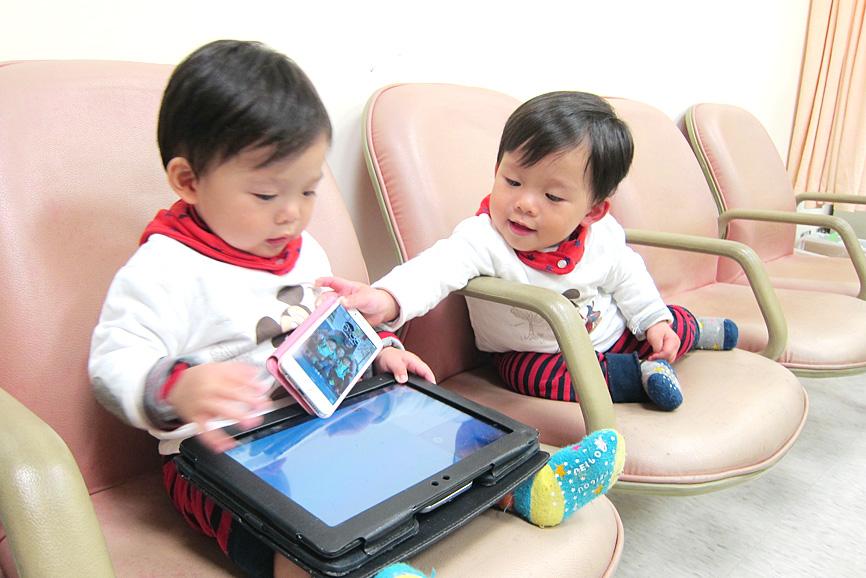More than 90 percent of Taiwanese aged three to five use personal electronic devices at home, with three-year-olds averaging a screen time of two hours and 17 minutes per day, a survey released yesterday said.
The survey of 1,732 parents, which counted the use of computers, communication devices and consumer electronics, was released at a news conference by National Taiwan Normal University (NTNU) and Parenting magazine.
It found that more than 90 percent of children of that age group used screen-based devices at home, with the youngest children surveyed having the longest average screen time.

Photo: Ho Tsung-han, Taipei Times
Three-year-olds averaged two hours and 17 minutes of screen time per day, while four-year-olds averaged one hour and 59 minutes and five-year-olds averaged one hour and 36 minutes, the survey showed.
Three-year-old children of lower-middle-class-background had the highest daily screen time, at three hours and two minutes on average, the survey showed.
“The more children are using these devices, the less they are interacting with their parents,” said Chang Chien-ju (張鑑如), a professor in NTNU’s Department of Human Development and Family Studies who is one of the survey’s directors.
“This negatively affects their social, emotional and physical development, as well as their cognitive and linguistic abilities,” she said.
Chang recommended that parents limit their children’s daily screen time to less than one hour, and to use the extra time to play, read or talk with their children, or have meals together.
K-12 Education Administration Director-General Peng Fu-yuan (彭富源) said that personal electronics use was highest among three-year-olds who had not yet entered preschool.
The Ministry of Education is considering sending information about how to reduce children’s use of electronic devices with the statements for monthly childcare subsidies that most parents receive, he said.
The Ministry of Health and Welfare recommends that three-year-olds be limited to 30 minutes of screen time per day and that four to six-year-olds be limited to one hour, with a 10-minute break every half an hour to rest their eyes.

Taiwan has received more than US$70 million in royalties as of the end of last year from developing the F-16V jet as countries worldwide purchase or upgrade to this popular model, government and military officials said on Saturday. Taiwan funded the development of the F-16V jet and ended up the sole investor as other countries withdrew from the program. Now the F-16V is increasingly popular and countries must pay Taiwan a percentage in royalties when they purchase new F-16V aircraft or upgrade older F-16 models. The next five years are expected to be the peak for these royalties, with Taiwan potentially earning

STAY IN YOUR LANE: As the US and Israel attack Iran, the ministry has warned China not to overstep by including Taiwanese citizens in its evacuation orders The Ministry of Foreign Affairs (MOFA) yesterday rebuked a statement by China’s embassy in Israel that it would evacuate Taiwanese holders of Chinese travel documents from Israel amid the latter’s escalating conflict with Iran. Tensions have risen across the Middle East in the wake of US and Israeli airstrikes on Iran beginning Saturday. China subsequently issued an evacuation notice for its citizens. In a news release, the Chinese embassy in Israel said holders of “Taiwan compatriot permits (台胞證)” issued to Taiwanese nationals by Chinese authorities for travel to China — could register for evacuation to Egypt. In Taipei, the ministry yesterday said Taiwan

Taiwan is awaiting official notification from the US regarding the status of the Agreement on Reciprocal Trade (ART) after the US Supreme Court ruled US President Donald Trump's global tariffs unconstitutional. Speaking to reporters before a legislative hearing today, Premier Cho Jung-tai (卓榮泰) said that Taiwan's negotiation team remains focused on ensuring that the bilateral trade deal remains intact despite the legal challenge to Trump's tariff policy. "The US has pledged to notify its trade partners once the subsequent administrative and legal processes are finalized, and that certainly includes Taiwan," Cho said when asked about opposition parties’ doubts that the ART was

If China chose to invade Taiwan tomorrow, it would only have to sever three undersea fiber-optic cable clusters to cause a data blackout, Jason Hsu (許毓仁), a senior fellow at the Hudson Institute and former Chinese Nationalist Party (KMT) legislator, told a US security panel yesterday. In a Taiwan contingency, cable disruption would be one of the earliest preinvasion actions and the signal that escalation had begun, he said, adding that Taiwan’s current cable repair capabilities are insufficient. The US-China Economic and Security Review Commission (USCC) yesterday held a hearing on US-China Competition Under the Sea, with Hsu speaking on